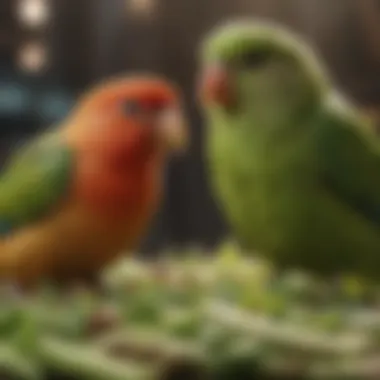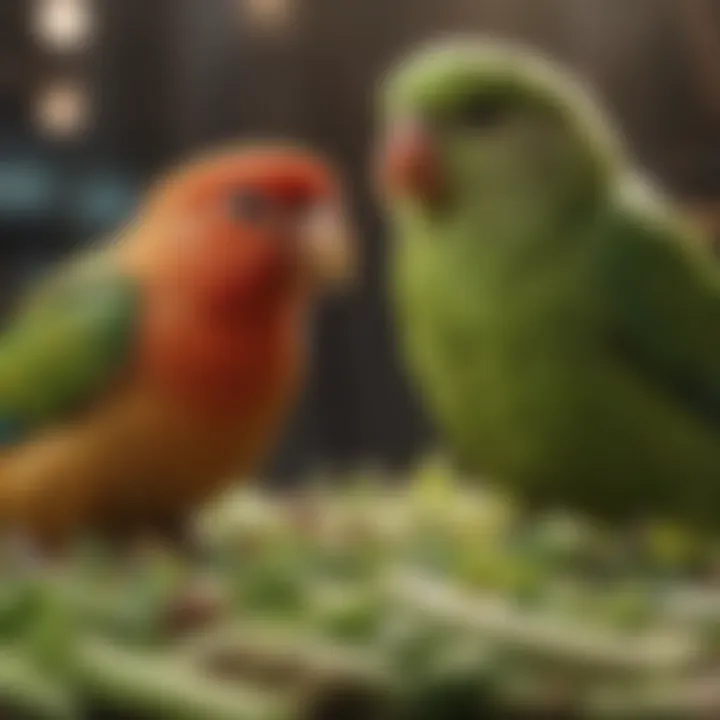Celery: A Healthy Addition to Your Pet Birds' Diet


Intro
In the vast landscape of pet care, the concept of nutrition often takes center stage, especially when it comes to birds. These lively creatures, with their unique lifestyles and varied diets, have specific nutritional needs that can sometimes be overlooked. The humble celery, a green veggie often relegated to garnish status, has something significant to offer avian companions. While many pet owners may tend to gravitate towards seed-based diets, an exploration into fresh vegetables like celery reveals a potential wealth of health benefits.
Celery is more than just a crunchy snack; it's a powerhouse of nutrients that can support your pet bird's overall well-being. From vitamins to minerals, this green stalk contributes essential dietary elements that can enhance the vibrancy and longevity of your feathered friend. However, just as important as knowing the nutritional aspects is understanding how to safely incorporate this vegetable into their meals—after all, changing a bird's diet can sometimes be a tricky endeavor.
In this guide, we will not only be diving into the benefits of feeding celery to your birds but also crafting a roadmap of practical tips to ensure a seamless introduction of this vegetable. By recognizing the individual needs of different bird species and learning safe serving methods, pet bird owners can cultivate healthy eating habits that benefit their feathery companions tremendously.
Foreword to Celery in Avian Diets
Introducing celery into your pet bird's diet may seem like a small detail, but it can have a profound impact on their overall health and well-being. This vibrant green vegetable serves as a refreshing snack, packed full of nutrients, which makes it a worthy addition to your bird's menu. As bird owners or potential bird parents, understanding the specifics of avian nutrition can empower you to create a balanced diet that promotes longevity and vitality for your feathered friends.
Understanding Bird Nutrition
Bird nutrition isn’t as straightforward as one might think. Unlike cats or dogs that thrive largely on protein and fat, birds have unique dietary needs that are shaped by their natural habitats. Birds generally require a mix of seeds, fruits, vegetables, and grains for optimal health. Their digestive systems are designed to process a wide variety of foods, allowing them to benefit from numerous nutrients found in different foods.
Incorporating vegetables like celery can bolster this nutrient mosaic. Celery, specifically, is low in calories yet high in vitamins and hydration. It offers a mix of essential vitamins, such as Vitamin A, K, and potassium, among others. These contribute significantly to the bird’s immunity and overall functionality. For example, Vitamin A helps in maintaining healthy vision, while potassium is crucial for nerve function.
Being mindful about portion sizes and variety — a common saying in bird care is, "a little bit of everything is better than a lot of one thing". This encapsulates the essence of providing numerous food options that cater to the diverse needs of your avian companions.
The Role of Vegetables in Bird Diets
Vegetables play a crucial role in avian diets. They not only provide vitamins and minerals but also account for hydration. Birds get a significant portion of their water intake from fresh fruits and vegetables. Celery, for example, is approximately 95% water. When birds munch on it, they're not just getting nutrients; they’re also taking in moisture, which is vital in maintaining optimal bodily functions.
Further, the fiber found in vegetables aids in digestion and helps prevent gastrointestinal issues. The crunchy texture of celery can also keep your bird entertained and stimulated — after all, birds enjoy pecking and chewing. Ensuring that your pet bird has a variety of vegetables will contribute not only to their diet but can also be a source of mental engagement.
In summary, understanding the nutrition needs of pet birds, including the significance of vegetables like celery, allows owners to contribute to their pet’s optimal health. By providing a balanced array of foods that mirrors their natural diets, you will cultivate both a happy and healthy bird.
Nutritional Profile of Celery
Celery is more than just a crunchy snack; it's a treasure trove of nutrients that can significantly enhance your pet bird's diet. Understanding its nutritional profile is vital for any bird owner who desires to provide a well-rounded and indispensable dietary component. Celery is low in calories while bursting with vitamins, minerals, and hydration benefits, making it an excellent choice for a healthy avian lifestyle.
Vitamins and Minerals
Vitamin A
Vitamin A plays a pivotal role in maintaining the overall health of birds. It's integral for vision, skin health, and proper immune function. One notable aspect of Vitamin A is its ability to support the development of feathers. Healthy plumage is not just cosmetic; it can greatly affect a bird's well-being and vitality. Offering celery as a source of Vitamin A is a wise choice since it’s relatively easy to incorporate into their diet, and birds typically enjoy the crunch.
A unique feature of Vitamin A is its retention in the body, which means that although birds need it regularly, the effects are long-term. The downside might be that too much can lead to toxicity, so moderation is key.
Vitamin K
Vitamin K is another superhero nutrient found in celery, crucial for blood clotting. This function is particularly important for birds, which can be prone to injury and require quick healing. A significant characteristic of Vitamin K is its role in bone health as well, helping ensure that the skeletal structure remains strong.
The unique feature of Vitamin K in celery lies in its synergy with other vitamins, enhancing overall nutrition efficiency. However, while Vitamin K is abundant in celery, it's important not to rely on it entirely for this nutrient. Including a variety of sources helps ensure their diets are nutritionally complete.
Potassium
Potassium is vital for maintaining fluid balance and muscle function. Birds, like humans, require this mineral to function properly. Elevated potassium levels in their diet can help regulate blood pressure and support heart health, which is crucial for active species often engaged in flapping and climbing.
The highlight of potassium is its role in nerve transmission, making it an essential nutrient for excitatory and muscle signaling. Keep in mind, however, that although potassium is essential, excessive intake may lead to hyperkalemia, so balance in their diet is crucial.
Folate
Folate, also known as Vitamin B9, is another key player that can’t be overlooked in celery. It’s important for DNA synthesis and cell growth, which are critical during the breeding season or when babies are hatching. The key characteristic of folate is its role in preventing birth defects in hatchlings, making it especially crucial for breeding pairs.
A unique aspect of folate in celery is how it collaborates with other B vitamins to promote energy metabolism within the body. However, birds need a steady supply; without it, they may experience lethargy or digestive issues.


Fiber Content
Celery isn’t just a veggie; it serves as an excellent source of dietary fiber, supporting digestive health in birds. High fiber intake facilitates smoother digestion and can help prevent issues like constipation. Furthermore, fiber plays a role in regulating blood sugar, which is critical for maintaining a stable energy level.
Birds digest food quickly, and having enough fiber in their diet can help slow down this process, allowing for better nutrient absorption.
Hydration Benefits
Celery has a high water content, making it an effective natural source for keeping your bird hydrated. This is especially useful during hot weather or if your bird shows signs of dehydration.
Hydration is essential for supporting all bodily functions, including digestion, circulation, and temperature regulation. By incorporating celery into your bird's diet, you not only provide hydration but also add a delightful crunch that birds enjoy.
"Incorporating celery regularly can contribute positively to your bird's hydration and overall health."
In summary, the nutritional profile of celery provides a variety of essential vitamins and minerals, supporting numerous bodily functions and overall health in pet birds. Its benefits are numerous, and with careful preparation and offering methods, it can become a staple food in your bird’s diet.
Health Benefits of Celery for Birds
When considering the diet for pet birds, it's essential to take a closer look at the specific health advantages that various foods can provide. One such food item that stands out is celery. It is not just a crunchy snack; celery brings a range of health benefits that can enhance avian well-being. Understanding these benefits is crucial for pet owners who want the best for their feathered friends. With its unique nutritional profile, celery can contribute positively to various aspects of a bird's health.
Digestive Health
One of the most significant health advantages of celery is its role in supporting digestive health. This vegetable is high in fiber, which is essential for maintaining a healthy digestive tract. Just like humans, birds can benefit from a fiber-rich diet. Fiber aids in the smooth passing of food through the digestive system, preventing issues like constipation or gastrointestinal blockages. Birds that consume adequate amounts of fiber often show signs of better digestion overall. Regular inclusion of celery in a bird's diet can help keep their digestive system in tip-top shape.
Additionally, the crisp texture of celery might encourage birds to peck and chew, an important part of their feeding behavior. Chewing not only keeps their beaks healthy but also stimulates digestive enzymes, further promoting efficient digestion.
Weight Management
Weight management is another area where celery shines. Many pet birds can easily become overweight if their diets are not monitored closely. This is particularly true for species that are less active. Celery is low in calories but high in water content, which makes it an excellent food choice for birds needing to maintain a healthy weight. Including celery as part of a balanced diet can help ensure that birds feel full while avoiding unnecessary calorie intake. Feeding birds celery regularly can be a part of a strategy to reduce fat and increase overall health.
Bird owners can help prevent the risk of obesity-related issues, such as heart disease, by regularly offering celery as a part of their birds’ meals or as a snack. The act of chewing through this water-rich vegetable can also bring about a sense of fullness without filling them up on unhealthy options.
Antioxidant Properties
Additionally, celery contains certain antioxidants that play a pivotal role in promoting health. Antioxidants are known to combat oxidative stress caused by free radicals, which can lead to chronic health issues. For birds, a diet rich in antioxidant-producing foods like celery can contribute to increased immunity and better overall health.
Research indicates that fresh vegetables like celery can provide crucial vitamins that assist in fighting inflammation and bolster the immune system. This is particularly valuable for healthier skin and feather condition, crucial elements for any thriving pet bird. Overall, by integrating celery into your pet bird's diet, you're not just providing nourishment, but more importantly, you're laying a foundation for a longer, more vigorous life.
"Incorporating nutrient-rich foods like celery into your bird's diet is more than just a matter of taste—it's a matter of health."
By paying attention to these health benefits, bird owners can make informed decisions about their pets' diets, ensuring they are healthy and happy.
Species-Specific Considerations
Understanding that not all birds are created equal is paramount when it comes to their dietary needs. Just like humans, birds have unique nutritional requirements that vary among species. This section shines a light on how different types of pet birds respond to the inclusion of celery in their diets.
Parrots and Celery
Parrots, known for their vibrant personalities and intelligence, often require a varied diet to keep them healthy and engaged. Celery can be a fantastic addition for them.
- Nutritional Variety: Parrots thrive on a mix of fruits, vegetables, nuts, and seeds. Including celery provides essential vitamins, particularly vitamin A and K, that aid in their immune system and overall health.
- Texture and Engagement: These birds enjoy textures, and the crunchiness of celery can mimic the natural foraging behavior that keeps them stimulated.
- Potential Allergies: It's worth noting that some sensitive parrots might have a reaction to celery. Always introduce it gradually to observe how they respond.
Canaries and Celery
Canaries, with their sweeter songs and smaller frames, benefit from a diet that helps maintain their vocal quality and feather condition. Celery can play a part in this.
- Hydration Support: Because canaries are smaller, hydration is crucial for them. Celery's high water content can help keep them hydrated, especially in warmer climates.
- Balanced Diet: Adding celery alongside a seed mix can complement their diet, ensuring they get diverse nutrients. Remember, though, that their primary diet should remain seeds and pellets.
- Small Portions: Due to their size, it’s best to chop celery into smaller bites to prevent choking hazards.
Finches and Celery


Finches are active little birds needing a diet that fuels their energy burning lifestyle. Celery might surprise many as an asset to their feeding routine.
- Nutritional Boost: Finches benefit from the modest amount of fiber in celery, aiding digestion and overall gut health.
- Versatile Serving: These birds enjoy foraging, so whole sticks might be more appealing. They will pick at the celery, which can help keep their beaks healthy, too.
- Careful Observation: As with any new food, introduce celery slowly, watching their reactions closely. Some finches might be less familiar with it, so persistent offering is key.
"Different strokes for different folks" rings true in the avian world. Tailoring your bird’s diet to their specific needs ensures they live a long and vibrant life."
How to Introduce Celery to Your Bird
When incorporating a new vegetable into your bird's diet, how you introduce it can make all the difference. Celery, with its crunchy texture and fresh taste, can be a delightful addition to an avian diet. However, birds can be quite picky eaters. The goal is to make this introduction as smooth and enticing as possible. This section will delve into several preparation techniques and serving suggestions to help your feathered friends enjoy celery to the fullest.
Preparation Techniques
Washing
Washing celery thoroughly is a must. This step helps remove pesticide residues and dirt that might be hiding in the crevices of the stalks. Ensuring that your celery is clean not only promotes safety for your pet bird but also enhances the vegetable's fresh flavor. A quick rinse under cold running water followed by a gentle scrub with your hands can do wonders.
Here's why washing is a wise choice in this article:
- Key Characteristic: Safety comes first. It’s essential to eliminate any potential contaminants.
- Unique Feature: Washing is straightforward and doesn't require any special tools or skills.
While washing is beneficial, it's important to note that pre-cut celery or those from farmers' markets may require a bit more attention. Always inspect for any signs of spoilage even after washing.
Cutting
Cutting celery into manageable pieces is another critical step. Birds, especially smaller species, might find it challenging to tackle large chunks of celery. By slicing the stalks into smaller, bite-sized pieces, you can encourage your bird to explore this new food.
Benefits of Cutting:
- Key Characteristic: It makes the food accessible and less intimidating for your feathered friend.
- Unique Feature: You can experiment with various shapes, such as sticks or small cubes, to see which your bird prefers.
On the downside, be careful not to cut the celery too small; otherwise, it could become a choking hazard. Remember, moderation and supervision go a long way.
Cooking (if necessary)
While celery is typically served raw, some birds may benefit from cooked vegetables. Steaming celery can soften the texture, making it easier for some birds to consume. This method retains more nutrients than boiling. However, cooking is not essential for all birds.
Some points to consider about cooking:
- Key Characteristic: Steaming can enhance the flavor, potentially making it more appealing to picky eaters.
- Unique Feature: Offers a different texture that some birds might actually gravitate towards, especially older ones with weaker beaks.
Nevertheless, the cooking method may reduce some of the raw nutritional benefits. It’s best to observe your bird’s preferences and adjust accordingly.
Serving Suggestions
Raw vs. Cooked
When it comes to serving celery raw versus cooked, this topic has various implications for a bird's dietary needs. Raw celery is filled with crispness and retains its full range of vitamins and minerals, making it a popular choice for many bird owners. However, cooked celery provides an alternative that might cater to certain birds' tastes or dental needs.
Understanding these differences can help you make informed choices for your pet.
- Raw: Maintains nutritional integrity, ideal for those looking to maximize health benefits.
- Cooked: Easier for some birds to chew; good for those that have trouble with raw foods.
This balance is key - try offering both methods over time to gauge which your bird favors.
Combining with Other Foods
One effective strategy for encouraging your pet bird to try celery is to combine it with other foods they enjoy. Mixing chopped celery with their regular seed mix or serving it alongside popular fruits like apples or berries can entice your bird to sample this vegetable.
This blending of flavors works well for several reasons:


- Key Characteristic: Improves overall meal appeal by introducing variety.
- Unique Feature: Allows you to craft a balanced diet without making any single food item overwhelming.
Combining celery with other ingredients can also benefit picky eaters. This gradual introduction can lead to a more well-rounded diet in the long term.
Potential Risks and Precautions
When considering adding celery to your pet bird's diet, it’s really important to tread carefully. While celery offers numerous health benefits, there are certain risks and precautions that owners should be aware of. Understanding these risks can help you ensure that your feathered friend enjoys celery safely and healthily.
Pesticide Residues
A significant concern with any fruit or vegetable, including celery, is the potential for pesticide residues. Many commercial produce items are treated with chemicals to deter pests and enhance growth. Birds have delicate systems, and ingesting these substances can lead to health issues. Thus, it is essential to wash celery thoroughly before serving it to your bird. A good practice is to soak the celery in a mix of water and vinegar. This not only helps in removing dirt but might also eradicate some pesticide traces.
Using organic celery can mitigate this risk, as it's generally grown without synthetic pesticides. If you’re unsure about the source of your celery, it’s worth asking questions at your local market or looking for certification.
Choking Hazards
Another critical consideration is choking hazards. Celery has a fibrous texture and comes in long, crunchy stalks that can pose a risk. Birds, especially smaller breeds like canaries and finches, may struggle to chew larger pieces. To cut down on choking risks, always slice celery into manageable, bite-sized pieces appropriate for the size of the bird. The goal is to ensure your avian companion can easily consume the treat without any issues. Always supervise your bird while they are eating to catch any potential problems
Integrating Celery into a Balanced Diet
When it comes to providing for our feathered companions, a balanced diet is nothing short of essential. Integrating celery into a pet bird's diet is not just about adding another food item but about enhancing nutritional diversity. Celery can act as a valuable ally when mixed with other vegetables, seeds, or fruits. This integration helps ensure pet birds receive a wide array of vitamins and minerals that are critical for their overall health and well-being.
The simple act of incorporating celery alongside other nutritious foods can yield numerous benefits. For one, it can enrich their meals, providing textures and flavors that engage a bird's natural curiosity. You want your pet to forage and find joy in their meals, much like they would in the wild.
Celery isn’t just a crunchy snack; it’s an opportunity to diversify your bird’s diet.
Complementing Other Vegetables
While celery shines on its own, it truly comes to life when paired with other vegetables like carrots, bell peppers, or spinach. Each vegetable contributes its unique set of nutrients. For example, carrots offer beta-carotene, which is important for eye health, while bell peppers provide vitamin C, essential for a strong immune system.
When combining celery with these vegetables, consider the following:
- Color Variety: Different colored vegetables not only make the meal visually appealing, but they also signify various nutrient profiles.
- Texture and Taste: Mixing celery's crisp texture with softer veggies can create an inviting dish for your bird.
- Nutritional Boost: Pairing can amplify benefits by ensuring different vitamins and minerals are available in one sitting.
It’s also essential to think about preparation methods. Some birds may prefer their veggies raw, while others might enjoy them steamed lightly to enhance flavor without losing nutrients. Always watch how your bird responds and adjust accordingly.
The Importance of Variety
Just like with humans, birds benefit greatly from a varied diet. Feeding your pet bird a wide range of foods can help prevent nutritional deficiencies, promote good digestion, and even keep them mentally stimulated. Variety can also reduce the chances of dietary boredom, which is something that birds can easily fall into if their options are limited.
Here’s why mixing things up is crucial:
- Preventing Nutrient Deficiencies: Relying solely on one type of food, even a nutritious one like celery, can lead to gaps in a bird’s diet. A few carefully selected veggies or fruits alongside celery can cover this risk.
- Behavioral Enrichment: Birds are intelligent creatures requiring mental stimulation. Providing different foods encourages natural foraging behaviors, which is a key aspect of their well-being.
- Health Monitoring: Rotating foods can make it easier to spot any changes in eating habits, allowing for quicker identification of health concerns.
Finale
In summing up the variety of advantages that celery brings to the table, one can’t help but notice its pivotal role in enhancing the diet of pet birds. This simple vegetable is not just a garnish but rather a treasure trove of nutrients that can bolster overall health in your avian companions. Beyond just adding crunch, celery serves essential vitamins and minerals that aid in digestion, hydration, and even weight management. Prospective pet bird owners, or those looking to enrich their current birds' diets, should pay serious attention to integrating celery effectively.
Recap of Celery's Benefits
Nutritional Richness: Celery is packed with multiple essential vitamins such as Vitamin A, which is crucial for feather health, and Vitamin K, which plays a role in blood clotting.
Hydration: With its high water content, celery helps in keeping your bird hydrated. This is especially important during warm seasons when dehydration can sneak up on these lively creatures.
Digestive Aid: The fiber found in celery works wonders for your birds' digestive systems. A healthy digestive tract is foundational for nutrient absorption and overall well-being.
"Incorporating veggies like celery not only broadens the dietary palette for your birds but brings a gush of health benefits along with it."
Weight Management: When dealt with moderation, celery can help in managing the weight of birds, preventing obesity that can lead to other health issues.
Final Thoughts on Avian Nutrition
In the grand scheme of avian nutrition, every small ingredient matters, and celery is no exception. While focusing on high-quality pellets and grains is essential, the importance of fresh fruits and vegetables cannot be overstated. Birds, just like humans, thrive on variety. Feeding them a balanced array of foods, including celery, not only supports their physical health but can also enhance their mental stimulation.
When contemplating the diets of pet birds, taking a page from nature’s own cookbook—incorporating fresh, whole foods such as celery—can lead to happier, healthier birds. Remember, every pet bird is an individual with unique preferences. So, exploration is key. Variability in diet enriches their lives and fosters strong bonds between humans and their feathery friends.















